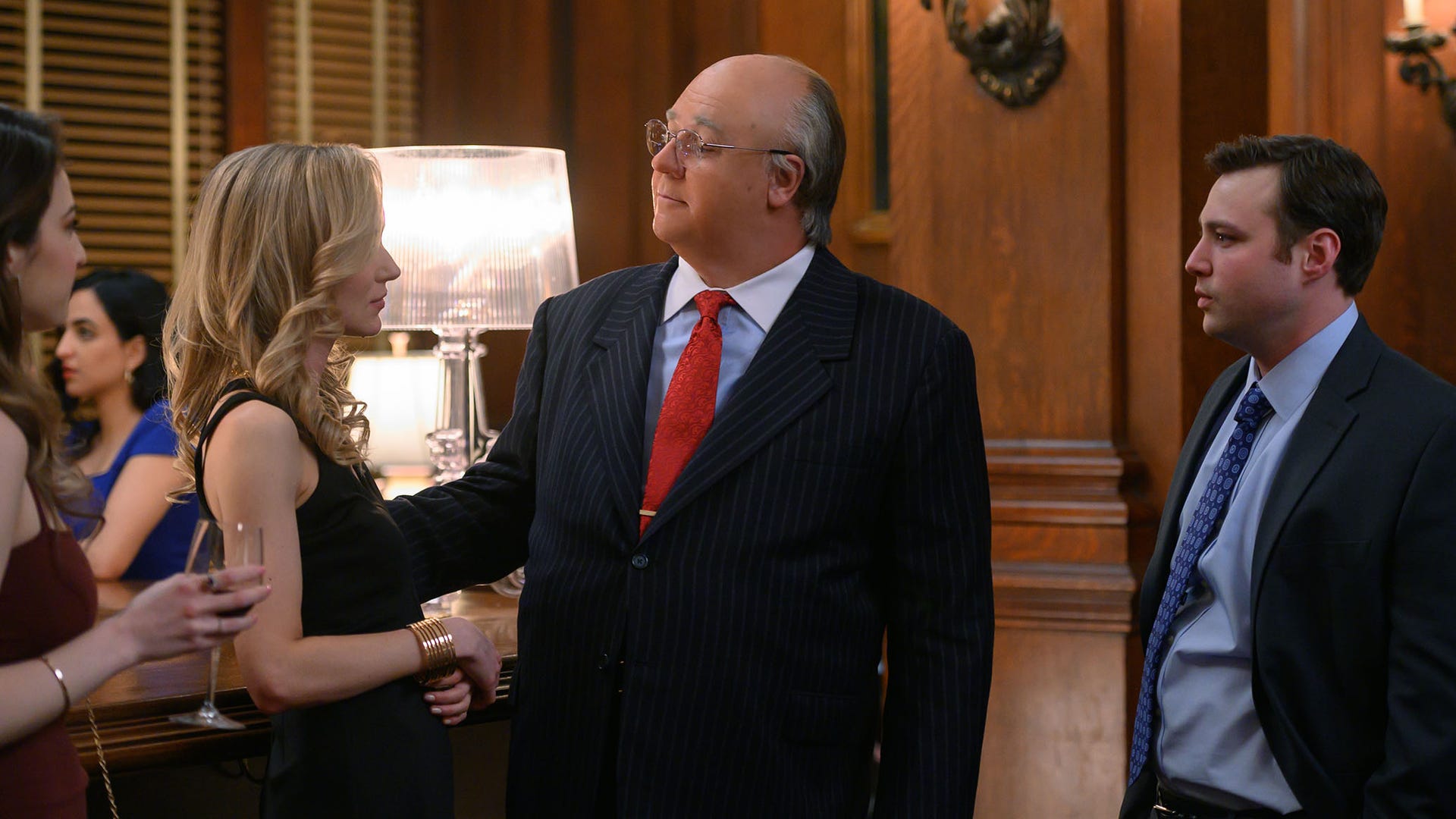Join or Sign In
Sign in to customize your TV listings
By joining TV Guide, you agree to our Terms of Use and acknowledge the data practices in our Privacy Policy.
The Loudest Voice Episode 4 Recap: Roger Ailes Kidnaps His Mistress
Plus: Fox News unleashes secret weapon Glenn Beck
A.J. Bauer is visiting assistant professor of media, culture, and communication at NYU and co-editor of News on the Right. Reece Peck is assistant professor of media culture at College of Staten Island (CUNY) and author of Fox Populism. Each week, they'll recap the new Showtime limited series The Loudest Voice.
When second-wave feminists rallied for women's rights, including equal pay and protection from gender-based violence and workplace discrimination, they often did so under the slogan: "The personal is political."
The Loudest Voice bastardizes that sentiment by making it Roger Ailes' guiding ethos.
Episode 4, "2009," chronicles Ailes' war against a fledgling Obama administration but foregrounds dueling personal subplots -- both rooted in misogyny and both, strangely, involving kidnapping.
The first concerns Fox booker and Ailes' mistress Laurie Luhn (Annabelle Wallis). Last week, as a gratuitous sexual assault scene made disturbingly clear, Luhn was already at her wits' end. This week's episode opens with Ailes (Russell Crowe) grunting through a revolting depiction of fellatio. When Luhn stops, insisting she "can't do this anymore," Ailes forces her to finish before coldly admitting that their years-long tryst had "run its course."
"On one condition," Ailes insists, in between bites of steak. "You find your replacement."
Luhn acquiesces, introducing Ailes to her assistant Carrie (Taylor Louderman) before ultimately suffering a psychotic break -- convinced, wrongly though not implausibly given his penchant for surveilling employees, that Ailes was having her followed. When she calls Ailes to plead with him to stop, he has her apprehended by Bill Shine (Josh Stamberg) and detained in a Manhattan penthouse. There, Ailes consults with Shine and then-senior vice president of programming and development, now Fox CEO, Suzanne Scott (Lucy Owen), who agree to hold Luhn indefinitely, "until we figure out where she belongs."

Annabelle Wallis as Laurie Luhn in The Loudest Voice.
JoJo Whilden/ShowtimePrevious episodes depicted Ailes as a devoted ideologue, committed to leveraging the power of cable television to promote a conservative agenda by any means necessary. Yet by 2009, a historical moment in which the conservative cause was imperiled by economic crisis and a newly elected Obama administration, Ailes seems driven less by ideology than by a thirst for personal power. He leverages Fox resources to satiate his sexual desire and to protect himself from the consequences.
Ailes' tendency to conflate conservative ideology with his own personal interest is exemplified in the episode's second main subplot -- he and Beth Ailes' purchase of the Putnam County News and Recorder. Initially designed as a "project" to keep Beth (Sienna Miller) occupied in the Hudson Valley, presumably so that Roger can continue his philandering unencumbered in the city, the newspaper quickly becomes a vehicle for his personal disputes with the local zoning board.
At first, Roger and Beth both seem sincerely interested in producing local conservative journalism. They hire Joe Lindsley (Emory Cohen), whose bona fides include founding a conservative student newspaper at Notre Dame and working as an editorial assistant for the (recently defunct) Weekly Standard. Joe's an archetypical movement conservative of the William F. Buckley mold, more comfortable professing his faith in God and quoting Russell Kirk than engaging in dirty tricks to "own the libs." His earnestness attracts Beth, even as it provides a convenient foil for Roger's partisan bloodthirst.
In the beginning, Beth takes the lead -- "I'm a TV guy, don't know a damn thing about newspapers," Roger demurs -- absconding with Joe, taking him upstate immediately after hiring him. In a series of scenes that flirt with both romance and horror generic conventions, Beth sits unnervingly close to her new cornfed Catholic boy employee on the SUV ride up to Garrison and insists that he call her by her first name. "After all, I'm not that much older than you," she smirks. She introduces him to the newspaper staff, who seem rightfully anxious at the new owners' powerplay. When Joe emphasizes teamwork to cheer up his new employees, Beth chides, "The staff work for you, Joe. Not with you."
After, when Joe inquires about returning home, he is invited (read: instructed) to live in the Ailes' pool house, which is creepily stocked with toiletries, a Joe-sized wardrobe (boxers included), and a copy of Roger's 1988 book You Are the Message, inscribed, "Joe, Everything I know is in this book. To a great future, Roger." What starts out as a weekend stay winds up lasting the entire episode, presumably weeks. As Joe becomes a constant presence in the Ailes' home, Beth's influence fades and Joe increasingly finds himself under Roger's political tutelage.

Russell Crowe as Roger Ailes and Emory Cohen as Joe Lindsley in The Loudest Voice.
JoJo Whilden/ShowtimeJoe's character serves two purposes in the grand scheme of The Loudest Voice. On the one hand, Joe is simply a plot device designed to enable Ailes to expound on the highlights of his pre-Fox biography -- his booking of Richard Nixon on The Mike Douglas Show, his instrumental role in Nixon's successful 1968 presidential run, his hemophilia. Joe serves as a stand-in for the audience, nodding along politely as Ailes rattles off the greatest hits of his self-mythologizing personal narrative.
Joe also stands in for a principled conservative journalism that both preceded and was ultimately eclipsed by Ailes' Fox News. While Joe's worldview is undoubtedly driven by conservative political and moral values, he nevertheless sees journalism as a truth-seeking endeavor. Ailes holds a different view, spelling out Fox News' mission for Joe: "We don't follow the news. We make the news."
Ailes' ongoing war with the Obama administration proves a case in point. It's mid-2009. President Obama has signed the stimulus act and is pushing what would later become known, thanks in no small part to Fox, as "Obamacare." A stock-footage montage reminds us of Fox's histrionic coverage, replete with Hitler comparisons and accusations of a hostile socialist takeover of America. The Obama administration reacts, calling out Fox as not a news network but a "very one-sided opinion organization."
Brian Lewis (Seth MacFarlane) panics, as always, fearing Rupert Murdoch's wrath and consequences for Fox's branding as a news outlet. Ailes, unphased, declares war -- unleashing newly hired host Glenn Beck (Josh McDermitt) as his primary weapon. Beck, who in real life nurtured a fascinatingly complex on-screen persona equal parts clown and college professor, is portrayed flatly as a mere repeater of scare words and platitudes.

Josh McDermott as Glenn Beck in The Loudest Voice.
JoJo Whilden/ShowtimeWhen Beck calls Obama a "racist" live on Fox & Friends, the Obama administration freezes Fox out -- refusing to schedule top officials for interviews on the network. Ailes, furious, retaliates by giving Beck the greenlight to air heavily doctored footage -- obtained by Breitbart and produced by James O'Keefe -- that portrayed the community organizing group ACORN as facilitating sex trafficking.
Watching back home with Joe, Ailes is tickled by his dirty trick, "This story is going to be huge!"
"Yes, but is it news?" Joe asks, concerned by the selective editing of the clearly manipulated footage.
"Maybe this is one of those moments when your idealism runs into a wall called knowledge," Ailes chides. "You try telling me you don't think The New York Times isn't selectively edited every goddamned day? Bias is everywhere."
Joe, time and time again, seems convinced by Ailes' defensive and self-aggrandizing quips -- a metaphor for Fox News' role in the slow but steady shift of conservative media away ideological purity and toward partisan loyalty. But if this episode succeeds in clarifying Fox's increasingly dominant and influential position within the conservative mediasphere at that time, it once again overstates the network's broader significance.
For example, during one of his characteristic boardroom rants, Ailes fumes, "We don't even have any proof that Obama is a citizen." Bill Shine replies, "Did you feed that to Trump? He was just on The View questioning Obama's birth certificate."
"Might have had a dinner," Ailes replies knowingly -- as if we have Ailes, and only Ailes, to blame for Trump's political stardom.
More egregious is this episode's treatment of the Tea Party movement, which was famously sparked by an on-air rant by Rick Santelli on CNBC (not Fox). Fox News was by no means uniquely culpable in promoting the burgeoning Tea Party brand, although Glenn Beck did his best to harness the right-wing populist sentiments of the era into his own 9/12 Project.
Instead of depicting the real grassroots momentum of the Tea Party movement, and Fox's challenge in maintaining some semblance of balance while promoting it, this episode casts Ailes himself as embodying the movement -- leading a raucous town hall in Garrison in order to secure a zoning exemption for his personal property.
Once again, The Loudest Voice eschews the complicated reality of U.S. political culture, choosing instead to render every right-wing political phenomenon of the 21st century as originating from the deviant mind of one self-serving, fatally flawed misogynist.
More recaps: Episode 1 | Episode 2 | Episode 3 | Episode 4 | Episode 5 | Episode 6 | Episode 7
The Loudest Voice airs Sundays at 10 p.m. ET/PT on Showtime. For more on the show, visit the official Showtime show page. (What channel is Showtime on? Find out here.)
(Disclosure: TV Guide is part of the CBS Corporation, Showtime's parent company.)